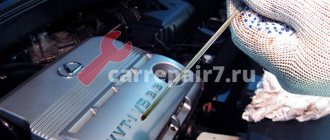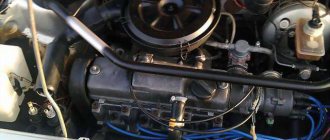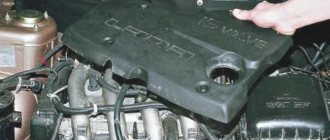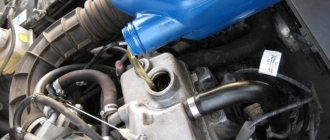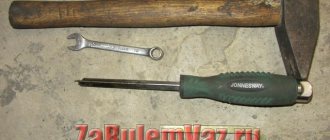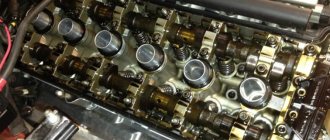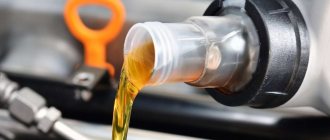In Russia, many cars have a service life of more than ten years and a mileage of 100 thousand km. These indicators indicate that many parts of the car are worn out and require repair, and sometimes replacement. The goal of auto chemical manufacturers is to support worn parts and try to restore their technical properties. This will extend the period of use of transport.
Today I would like to talk about what engine additives are used to reduce oil consumption. How do such compositions work and do they really achieve the desired result? We will separately touch upon the cost of production.
Possible consequences of wear and tear and harsh use of the car
According to the existing operating conditions of the vehicle, special oil is poured into the engine. As you travel, the product is consumed. This is due to the fact that the temperature inside the internal combustion engine is very high and the oil “burns”. The harsher the operating conditions of transport, the higher the temperature. In other words, oil in sports car engines is consumed much faster, and the engine itself wears out.
This rhythm leads to the fact that when crossing a certain threshold (over 100 thousand kilometers), the machine begins to “eat up” oil. This situation is very unpleasant, as it leads to additional costs for the driver and subsequent repair work. Oil burns can occur for various reasons:
- low-quality oil was poured or the composition was incorrectly selected in terms of viscosity;
- during a lubricant change, an overflow of substance occurred;
- The spark plugs are not working well, there is wear on the cylinders or pistons, there are problems with the oil seals;
- oil leaks through gaskets and seals, other seals that have lost their shape;
- Sometimes, lubricant is thrown out through the turbine.
The first two reasons are considered the most common. The lubricant is not consumed, but gradually “kills” the motor. To solve problems, you will need to use special additives.
Basic operating principle
Solutions that affect oil consumption operate on two basic principles:
- create a thin film on the internal parts of the engine that reduces gaps;
- make the oil itself thicker and more viscous.
These products change the structure of the oil.
The fuel additive for gasoline engines differs in composition and technical characteristics from the product for a diesel engine. Therefore, when purchasing, you should consider the type of engine.
Pros of using them
Disputes about the use of the compounds in question do not subside among car owners. The advantages are mainly:
- reduction in fuel consumption;
- smooth and stable engine operation;
- reduction of compression;
- increasing the resource of the internal combustion engine;
- reduction of noise level from the motor;
- reduction in oil consumption.
A high-quality fuel additive will ensure uninterrupted operation of the engine.
Of course, the car’s engine will not become new, but its service life will be significantly extended.
Minuses
The disadvantages of using the funds in question include:
- The use of molybdenum disulfide, which is known not only as a lubricant. It cannot mix perfectly with oil, and in some parts it harms the engine.
- Expensive, since high-quality additives can be more expensive than a simple oil change.
Molybdenum disulfide in oil often harms the engine.
But most car owners still consider it correct to use the compounds in question to reduce oil waste.
What effect do additive compounds have?
An additive against oil burn in the engine, as the name suggests, should help reduce the consumption of the oil product in the internal combustion engine. Unfortunately, many substances in this group turn out to be useless. Yes, manufacturers say that the compositions are of high quality and perform the task perfectly, but in the end, the buyer does not notice any effect. The problem is not that the formulations do not meet the requirements. Many drivers begin to pour additives into engines that have already served their purpose and now require a cap. repair or replacement.
In addition, it is important to understand that the results of using supplements may not appear immediately, but only after some time. After pouring, the additive is distributed throughout the system, has a positive effect on parts, eliminates scratches and other defects. The compounds help increase the level of compression in the cylinders. As a result of this effect, it becomes possible to reduce oil consumption.
It is worth noting that the effect of additives is not very long. Usually, the first time the lubricant is changed, the effect disappears. There are, however, imported compounds that can have a positive effect over a distance of 50-120 km. mileage The functional capabilities of additive compositions include:
- the operating life of the internal combustion engine increases by 20-30%;
- decoking of the piston rings occurs, and then compression in the cylinders rises;
- Carbon deposits and other deposits are removed from the cylinder surface;
- hydraulic compensator valves are restored;
- fuel consumption is reduced by 5%;
- The engine power increases, and you can start it cold.
Not all of the listed effects always occur. Much depends on the condition of the car. If the vehicle is heavily worn, the impact of additives will be minimal.
Bardahl Turbo Protect
Bardahl Turbo Protect
This additive is designed for turbocharged engines, and it is suitable for any of their modifications. Motorists buy this additive for:
- turbocharged diesel and gasoline units;
- for passenger and commercial vehicles;
- for sports cars.
The additive includes a good cleaning package, so the composition cleanses the insides of the engine well from dirt and carbon deposits. Due to the phosphorus and zinc content, this additive ensures the formation of a strong protective film between rubbing parts.
Classification of additives according to the result of use
The range of chemical products for cars is very wide. There are several supplements that have already proven themselves to be the best. All additives can be divided into groups:
- Detergents. Clean the engine from harmful deposits and impurities. Suitable for used engines.
- Dispersed. Cleans the motor and reduces friction. They are considered universal.
- Additives to mineral oils. Suitable only for suitable oil formulations. Retain fluidity even at low temperatures. Extreme pressure additives are especially popular.
- Anti-foam additives. Powerful, allow you to remove residual detergent additives. Change chem. oil composition.
In any case, additives must be used strictly according to the instructions to avoid negative effects on the engine and individual elements of the system.
The best additives for cleaning the fuel system of a gasoline engine
This group of additives affects the entire system, cleaning from the fuel tank to the injectors. In this case, carbon deposits are removed from the surfaces of the combustion chamber and other elements.
Suprotec Active Plus
It is used for any gasoline and gas engines (including forced and turbocharged ones) with a mileage of over 50 thousand kilometers, that is, those that have been fully run-in. The average cost of one 90 ml bottle is 1,400 rubles. One bottle is enough for one stage of engine treatment with an oil volume of up to 5 liters. For engines with an oil volume of up to 10 liters, 2 bottles are required. For normal processing in 3 stages, 3 or 6 bottles of the product are needed, depending on the engine size. Detailed instructions are provided on the official website.
The Suprotek additive is the best protection and restorative agent for serviceable automobile engines operating under various conditions. Of course, no composition will remove the bullies, no matter what the manufacturers promise, but Suprotek does not allow new ones to appear. Also, a 100% effect is observed if you need to clean the engine from dirt. Pouring additives into a fully serviceable engine increases its service life under normal conditions by 60%.
Reagent 3000
Designed to activate the catalytic fuel system with catalyst metal ions. This contributes to more complete and high-quality combustion, increased power and reduced fuel consumption by up to 25%!, reduced CO/CH and soot in the exhaust gases, reduced likelihood of burnout of valves and pistons and increased service life of spark plugs.
The composition cleans the nozzles of injectors/nozzles and the combustion chamber, decarbonizes the upper compression rings, restores the performance of the fuel injection pump and reduces its wear, protects the engine from the use of low-quality fuel, cleans and restores the functionality of the λ-probe and the exhaust gas afterburning catalyst.
It is recommended to use regularly. For more rational use, use the “3 in 2” scheme (3 times in a row for 3 full tanks, followed by skipping 2 applications), since the composition has a prolonged effect on 2 subsequent full fuel tanks, that is, a total of 500 liters
Autool C100
An effective system for flushing the fuel system of gasoline engines using any cleaning solvent. In the process of cleaning the injector, the parts of the cylinder-piston group and valves are also washed and coke deposits in the working part of the injectors are reduced, which entails fuel savings and restoration of engine power.
Autool C100
The kit includes corrosion-resistant tubing, which allows you to work with any cleaning solvent for fuel systems. Works with any source of compressed air - a pneumatic line or a regular household compressor for inflating tires. The kit includes a pressure gauge for monitoring pressure and a reducer for adjusting it. It takes about half an hour to wash.
Popular brands of additives for reducing oil consumption in internal combustion engines
There are many interesting solutions on the Russian market, but preference should be given to the most effective formulations. Let's look at popular and effective products from different companies.
| Additive name | Description |
| ER | Popular additive. It is used by drivers all over the world. Have no negative consequences. In fact, we are talking about a metal conditioner. As a result, the level of friction in the system decreases and compression increases. Oil waste is also reduced by 1.5-2%. Suitable for worn and new engines. |
| Suprotek – Universal 100 | Designed for old unboosted engines. The mileage reaches 200 thousand km. Oil consumption for waste is reduced by 2-3%. Allows you to start the engine when cold. |
| Oil-Versult-Stop | A German product that helps prevent oil loss in the engine lubrication system. Restores the elasticity of old seals and gaskets. Stabilizes temperature viscosity. |
Such additives are not considered cheap. In Russia, you can buy products for 500-700 rubles - capacity. It is important to first study the features and instructions for use of the product.
conclusions
If we talk about additives, then only in relation to worn-out engines. There are compounds that are poured into new power units. But this should not be done for the reason that up to 50 thousand km the engine does not need any oil additives. The gaps between the parts are small, and the oil compositions already have a sufficient set of additives for the normal operation of the new engine. At the same time, the use of additives can harm the engine. True, there are exceptions - for example, ER. But the effect of its use in the new engine is almost invisible. It can only appear after quite a long time and be expressed in an increase in the resource of the power unit.
Before using such auto chemicals, you should carefully read the instructions and decide whether the oil needs such an additive. If the engine runs normally and stably, and starts well, then all it needs is good quality oil. But after 100 thousand kilometers you can already think about additives.
Let's sum it up
So, why does high oil consumption occur:
- Wear of sealing elements (seals, caps, gaskets).
- Problems in the aggregate part (rings, cylinders).
If your car begins to consume more oil, you should not ignore this sign. Yes, the engine will work with such malfunctions, but this already indicates its wear and tear or other problems. It is also important to control the oil level to avoid starvation and use a product of the desired viscosity. You can replace oil seals or gaskets yourself, but it is better to entrust work with rings and sleeves to specialists.
Leak formation
Over time, the system loses its novelty, so it begins to leak in some places. This especially often happens due to valve stem seals. They lose their elasticity, which leads to leaks. It is worth immediately noting that such malfunctions must be eliminated through repairs. No additive will solve this problem.
Why are they then necessary? They are used for short-term effects. If you went on vacation or to another city and discovered a leak, it is usually not possible to fix it promptly. But this composition will help you reach the garage or service station. Regular use of such additives can adversely affect engine parts and disrupt its operation.
Determining the causes of increased lubrication consumption
In order to understand why the engine eats oil, it is necessary to study the nature and frequency of occurrences of alarming events and take into account additional factors that have appeared. This defect may be caused by the following reasons:
- Combustion of lubricant together with fuel caused by worn piston rings.
- Leakage through hardened gaskets and cracks in them.
- Penetration of lubricant into the cooling system through cylinder head gaskets that have lost their properties.
What should I put into the engine before selling it to prevent it from smoking?
Good afternoon. Today we have another article about the secrets of resellers. It happens that you have to sell cars with a dead engine that smokes; in this case, adding a special anti-smoke additive will help you. In the article you will find a video example of the use of this additive and its consequences.
The moral side of using the additive...
Put yourself in the buyer's shoes, you bought such a car and when changing the oil, or even after 2-3 days, it began to smoke. Will you be pleased?
To my shame, I only used this additive once! And then after that my ears were burning... It’s better to throw off 10-20 rubles, but honestly tell the buyer about the problem, or fill it with thick, expensive oil, but not additives.
Technical side...
There are 2 types of additives (non-working and working).
Ineffective additives.
We consider non-working additives to be those that seal irregularities in the cylinder-piston group with ceramics, and due to this, compression increases and oil consumption decreases...
At first glance, everything is fine... But if this were so, motor mechanics would become janitors or painters...
Agree that if these additives worked, everyone would fill them in and would not pay for expensive engine repairs.
Working additives.
It is not possible to repair the engine using additives, but you can reduce smoke by the so-called. oil thickeners.
How it works?
A honey-like liquid is poured into the engine. It increases the viscosity of the oil, i.e. it was 10W-40, now it’s 20W-60, at first glance everything is fine, and indeed the smokiness decreases, the oil pressure increases and even the noise level decreases, but a problem arises - accelerated engine wear. Often wear becomes catastrophic!
Smoking is reduced due to the fact that thicker oil enters the combustion chambers in much smaller quantities, but thick oil does not lubricate the cylinder walls well, and wear of the cylinder-piston group will be very rapid.
The worst thing is that the additive will not guarantee that the oil will not thicken too much.
Experience using the additive:
We had a cherry amulet for sale. It was painted, but it was impractical to make the engine; it smoked like this:
We didn’t sell it within a week, but we drove the car, and the result was this:
The result was that the engine had to be rebuilt! The additive works, but only if you fill it in the morning, drive the car to the car market by lunchtime, and sell it by the evening. But, I strongly do not advise you to do this, since you will earn 5-10 thousand rubles from this. but in the end you will lose your reputation; whether it is worth that kind of money is up to you to decide.
What should you put into the engine to relatively honestly sell a car with a smoking engine?
Everything is very simple. As we found out above, an additive that reduces smokiness thickens the oil. Accordingly, a similar effect can be obtained by pouring thick oil.
Fill with 5w-50 or even 10W-60 oil! Yes, this oil is quite expensive (at the time of writing about 500 rubles per liter), but this oil will not damage the engine as much as the additive.
By the way, all oils with such a viscosity are synthetic, with a low sulfur content, so these oils burn with a minimum amount of smoke!
That's all for me today. I think the article answered in detail the question of what to put in the engine so that it does not smoke before selling it?
If you have any questions or want to share your experience, please use the comments.


